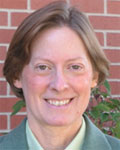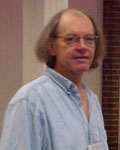Featured topic: Testing and assessment
Also explore
 Read and listen to a range of information about a particular area of applied linguistics. This month: Testing and assessment.
Read and listen to a range of information about a particular area of applied linguistics. This month: Testing and assessment.
Book of the month | Book chapters | Related journal articles | Resources | Related titles
Book of the month
About Carol A Chapelle

Carol A. Chapelle is Professor of TESL/Applied Linguistics at Iowa State University. She is co-editor of the Cambridge Applied Linguistics series and has published widely on issues in computer technology and applied linguistics. She is past president of the American Association for Applied Linguistics (2006–7) and former editor of TESOL Quarterly (1999–2004).
About Dan Douglas

Dan Douglas is Professor of TESL/Applied Linguistics at Iowa State University. His research centres on language testing, and he is past president of the International Language Testing Association (2005–6). He has served on the board of editors of several journals, including Language Testing and English for Specific Purposes.

Assessing Language through Computer Technology
Carol A. Chapelle and Dan Douglas
In 1998 and 1999, three of the largest providers of educational tests introduced computer-based versions of proficiency tests for English as a foreign language. Around the same time, many institutions began to offer Web-based tests for particular language courses and classes. These two phenomena have greatly added to the momentum of work in computer-assisted testing and mean that assessment through computer technology is becoming a fact for language learners in educational settings and therefore for teachers and researchers.
This book was the first to consider the theoretical, methodological and practical issues and their implications for language-teaching professionals wishing to engage with computer-assisted assessment. It overviews the work in the field, evaluates examples of assessment though computer technology, and provides language teachers and researchers with practical guidelines for implementation.
Read a sample chapter
The Impact of CALT (PDF)
(Chapter 6 of Assessing Language through Computer Technology, 2006)
Book chapters

Reading assessment (PDF)
William Grabe
(Chapter 17 of Reading in a Second Language, 2009)
'Reading assessment has great power to inform researchers, teachers, administrators, and policy makers. Assessment practices can significantly benefit the learning environment or they can inflict great harm. Reading assessment, therefore, needs to be treated with great care, attention, and respect…'

Assessment in Second Language Teacher Education (PDF)
Donald Freeman, Melinda McBee Orzulak and Gwynne Morrissey
(Chapter 8 of The Cambridge Guide to Second Language Teacher Education, 2009)
'Assessment … is changing. Several factors are driving the change, among them how we understand the work of teaching generally, language teaching in particular, and more fundamentally the role of teachers' knowledge in teaching. There are also issues of identity and practice … all of which are redefining theoretical frameworks for assessing knowledge-in-action.'
Related journal articles

The following articles are provided from Cambridge Journals Online.
'Dynamic assessment: The dialectic integration of instruction and assessment'
James P Lantolf
Language Teaching, Volume 42, Issue 03, Jul 2009, pp355–368
This presentation is situated within the general framework of Vygotsky's educational theory, which argues that development in formal educational activity is a fundamentally different process from development that occurs in the everyday world. A cornerstone of Vygotsky's theory is that to be successful education must be sensitive to learners' zone of proximal development. This requires the dialectical integration of instruction and assessment into a seamless and dynamic activity. The presentation includes a discussion of how the integration is systematically achieved in the process known as dynamic assessment and illustrates through analysis of data from advanced learners of French how this functions in second language education.
'Developing Assessment Literacy'
Lynda Taylor
Annual Review of Applied Linguistics, Volume 29, March 2009, pp21–36
Language testing and assessment have moved center stage in recent years, whether for educational, employment, or sociopolitical reasons. More and more people are involved in developing tests and using test score outcomes, though often without a background or training in assessment to equip them adequately for this role. Simultaneously, increasing professionalization of the field has led to the generation of standards, ethical codes, and guidelines for good testing practice. Although these can help make assessment practices more transparent and accessible to a wider constituency, they also risk promoting a view of language testing as highly technical and specialized–best left to experts. These trends have implications for both policy and practice. This article reviews efforts to promote understanding of assessment within the field of applied linguistics and within education and society more broadly. The role of professional associations, academic institutions, and commercial organizations in developing assessment literacy is considered, as well as the contribution of published material and other types of training resources. This article reflects on how the international language testing community can encourage the sharing of the core knowledge, skills, and understanding that underpin good quality assessment as widely and accessibly for the benefit of all.
'Validity In Language Assessment'
Carol A Chapelle
Annual Review of Applied Linguistics, Volume 19, January 1999, pp254–272
All previous papers on language assessment in the Annual Review of Applied Linguistics make explicit reference to validity. These reviews, like other work on language testing, use the term to refer to the quality or acceptability of a test. Beneath the apparent stability and clarity of the term, however, its meaning and scope have shifted over the past years. Given the significance of changes in the conception of validity, the time is ideal to probe its meaning for language assessment.
Assessment resources
Related titles
- Studies in Language Testing series
- Cambridge Language Assessment series
- Testing for Language Teachers (Second edition), Arthur Hughes
- Computer Applications in Second Language Acquisition, Carol A Chapelle
- Assessing Writing, Sara Cushing Weigle
- Assessing Speaking, Sari Luoma
- Assessing Young Language Learners, Penny McKay
- Assessing Listening, Gary Buck
- Assessing Reading, J Charles Alderson
- Examining Reading, Hanan Khalifa and Cyril J Weir
- Examining Writing, Stuart D Shaw and Cyril J Weir
- Examining FCE and CAE, Roger Hawkey
- Criterion-referenced Language Testing, James Dean Brown and Thom Hudson
- Interfaces between Second Language Acquisition and Language Testing Research, Lyle F. Bachman and Andrew D. Cohen (eds.)
- Language Test Construction and Evaluation, J Charles Alderson, Caroline Clapham and Dianne Wall
